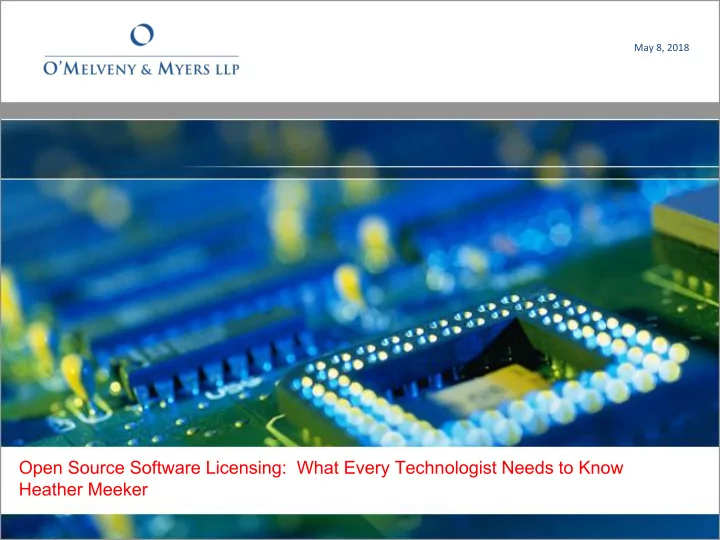

May 8, 2018 Open Source Software Licensing: What Every Technologist Needs to Know Heather Meeker
Foundations of Open Source 1
What is Open Source Development? Cathedral Bazaar http://www.catb.org/esr/writings/cathedral-bazaar/ 2
RMS v. the Xerox 9700 • Richard M. Stallman, a staff software programmer at the MIT AI lab, and, had trouble with a printer. • The printer was a prototype from Xerox with a tendency to jam. When it jammed, print jobs stacked up. • Stallman wanted to insert a software command into the printer software that ordered his computer to check the printer periodically and report back with a message if the printer was jammed. • But the software in the printer was only in object code format. • Xerox would not share the source code. And then Mr. Stallman wrote the GPL... For the full story, see http://www.oreilly.com/openbook/freedom/ch01.html 3
Open Source Is Not New • Development of UNIX at AT&T Bell Labs • Open source release • Privatization • The search for a UNIX successor 4
What is Open Source Licensing? • Terms of art ○ Copyleft ■ Not public domain ■ Not a “virus” ○ Open Source ○ Proprietary 5
What is Open Source Licensing? Unrestricted licenses with conditions e ! r a h s t s u m u o y t u b , a t e n a c u o You can look, but not eat! Y 6
The Open Source Licenses 7
Copyleft Rules • Open Source Initiative has approved over 80 licenses, but almost all OSS is under these: ○ GPL ○ LGPL ○ BSD ○ MIT ○ Apache 2.0 ○ Eclipse Public License, CDDL, Mozilla Public License 8
Two Philosophies: Open Source and Free Software • Permissive software = MIT, BSD, Apache ○ If you distribute, provide notice • Free software = GPL ○ If you distribute, use the same terms ○ If you distribute, provide source code 9
Copyleft Rules • GPL -- Strong copyleft ○ If any code in a program is GPL, it must all be GPL (all or none) ○ This means no “linking” to proprietary code • LGPL -- Weak copyleft ○ If any code in a library is LGPL, it must all be LGPL ○ But you can dynamically link to proprietary code 10
Derivative Works • “Derivative work” ○ Mostly a red herring ○ If you put GPL code in a program, the entire program (including the GPL portion) is a derivative work of the GPL portion 11
Linking • Static v. Dynamic Linking ○ Only matters to LGPL ○ Many languages do not use the concept of linking ○ GPL/LGPL were written for C/C++ programming, i.e. the Linux kernel 12
Top Questions in Open Source Licensing 13
Top Questions in Open Source Licensing • What is distribution? • If I release my software under an open source license, what happens to my patents? • How do I put notices on my product? • What is a “derivative work”? 14
What is Distribution? • Distribution is transferring a copy from one legal person to another • Most open source licenses impose no conditions absent distribution • For most licenses, SAAS is not considered distribution • Exceptions: ○ Affero GPL (AGPL) ○ Open Software License ○ Non-Profit Open Source License ○ Academic Free License ○ Artistic 2.0 ○ Apple Public Source License ○ RealNetworks Public Source License ○ Reciprocal Public License 15
What about Patents? • Some open source licenses include express patent licenses ○ Apache 2.0 ○ GPL3 • Some open source licenses say nothing about patents ○ BSD Either way, releasing ○ MIT open source code can limit your patent rights. ○ GPL2 16
How to do Notices? • Use the rules of GPL -- they work for most licenses • Notices must be delivered with the product • Delivering source code upfront is easiest • If not, create a notice file 17
What is a “derivative work”? • That is not the right question • The right question is: how do I comply with GPL? • Short answer: All code in a single executable process (i.e. a “Program”) must be either all GPL or no GPL. 18
For your ample free time... HEATHER MEEKER Partner O’Melveny & Myers Technology Transactions Group hmeeker@omm.com 510-463-1116 blog at heathermeeker.com m r o f k o o b e r o r e p a p n i e l b a l i a v A 19
Recommend
More recommend